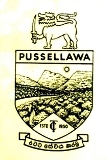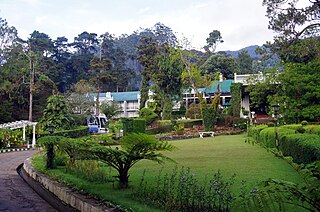Related Research Articles

Nuwara Eliya is a city in the hill country of the Central Province, Sri Lanka. Its name means "city on the plain " or "city of light". The city is the administrative capital of Nuwara Eliya District, with a picturesque landscape and temperate climate. It is at an altitude of 1,868 m (6,128 ft) and is considered to be the most important location for tea production in Sri Lanka. The city is overlooked by Pidurutalagala, the tallest mountain in Sri Lanka. Nuwara Eliya is known for its temperate, cool climate – the coolest area in Sri Lanka.

Hatton is a major town in the Nuwara Eliya District of Central Province, Sri Lanka governed by the Hatton-Dickoya Urban Council. Hatton is a major centre of the Sri Lankan tea industry.

Badulla is the capital and the largest city of Uva Province situated in the lower central hills of Sri Lanka. It is the capital city of Uva Province and the Badulla District.

Pussellawa Sinhala: පුස්සැල්ලාව. Tamil: புசல்லாவ, is a l town in Kandy District, Sri Lanka. It is located along the A5 road between Gampola and Nuwara Eliya.

Lipton is a British-American brand of tea, owned by Lipton Teas and Infusions. Lipton was also a supermarket chain in the United Kingdom, later sold to Argyll Foods, after which the company sold only tea. The company is named after its founder, Sir Thomas Lipton, who founded it in 1890. The Lipton Ready to drink beverages are sold by "Pepsi Lipton International", a company jointly owned by Unilever and PepsiCo.

The Grand Hotel is a four-star boutique hotel in Nuwara Eliya, Sri Lanka, that was built in the style of an Elizabethan-era manor house. The hotel has 154 rooms, including three presidential suites, four junior suites, including a governor's suite that have been maintained to preserve the traditional design. The Grand Hotel has a number of restaurants, bars and a billiards room.

Richard Phineas Hudson was a Reform Party Member of Parliament in New Zealand. Born in Ireland, he was a tea planter in British Ceylon before becoming a fruit grower in New Zealand.

The Central Province is one of the nine Provinces of Sri Lanka, the first level administrative division of the country. The Central Province is primarily in the central mountainous terrain of Sri Lanka. It is the 6th largest province by area and is home to 2.5 million people. It is bordered by North Central Province to the north, Uva Province to the east, North Western Province to the west and Sabaragamuwa Province to the south and west. The province's capital is Kandy.

The Hill Club is a gentlemen's club in Nuwara Eliya, Sri Lanka. Established 1876 by British coffee planters in the hill station of Nuwara Eliya.
Uda Pussellawa Railway (UPR) or Udupussallawa Railway (Sinhala: උඩුපුස්සැල්ලාව දුම්රිය මාර්ගය Uḍupussællāwa Dumriya Mārgaya) was a 2 ft 6 in (762 mm) narrow gauge railway line that existed in Ceylon (now Sri Lanka) between 1903 and 1948. The line connected Nanu Oya railway station with Ragala via Nuwara Eliya.

Sri Lanka has a climate and varied elevation that allows for the production of both Camellia sinensis var. assamica and Camellia sinensis var. sinensis, with the assamica varietal holding the majority of production. Tea production is one of the main sources of foreign exchange for Sri Lanka, and accounts for 2% of GDP, contributing over US$1.3 billion in 2021 to the economy of Sri Lanka. It employs, directly or indirectly, over 1 million people, and in 1995 directly employed 215,338 on tea plantations and estates. In addition, tea planting by smallholders is the source of employment for thousands whilst it is also the main form of livelihood for tens of thousands of families. Sri Lanka is the world's fourth-largest producer of tea. In 1995, it was the world's leading exporter of tea, with 23% of the total world export, and Sri Lanka ranked second on tea export earnings in 2020 after China. The highest production of 340 million kg was recorded in 2013, while the production in 2014 was slightly reduced to 338 million kg.

Holy Trinity Church is an Anglican church in Nuwara Eliya in Sri Lanka.

The St. Andrew's Hotel is a luxury hotel in Nuwara Eliya, Sri Lanka, built adjoining the Nuwara Eliya golf course.
Norman Rowsell was an Englishman who was one of the first tea planters in British Ceylon. He was also a well known sportsman and became the first Ceylon Labour Commissioner.

St. Mark's Church, is an Anglican church in Badulla in Sri Lanka. The church is located in the central ward of Badulla Municipal Council at the junction of Mahiyangana – Badulla main road (B36). It was consecrated on 25 April 1857 by Bishop James Chapman. In April 2008 the church and the bell tower were formally recognised by the Government as an archaeological protected monument in Sri Lanka and declared as "protected monuments" by the acting Minister of National Heritage, Mahinda Yapa Abeywardena. The designation was formally included on 6 June 2008 in the government Gazette number 1553.
Frederick Charles Loos was a Ceylonese lawyer and politician.
Donald Jasen Ranaweera, MBE, JP was a Sri Lankan plantation owner, press baron and politician. He was the Chairmen of the Times of Ceylon and served as the member of parliament from Maskeliya (1960) and Nuwara Eliya (1965-1970).

Charles Spearman Armstrong (1847–1924) was an Irish-born pioneer of tea and cinchona in British Ceylon, where he arrived in 1863.

Sir Edward Rosling was a Ceylonese tea planter and politician.

Great Western railway station is the 61st railway station on the Main Line, and is 199.3 km (123.8 mi) away from Colombo.
References
- 1 2 3 4 5 6 7 8 9 10 11 Ferguson, J., ed. (August 1897). "The Tropical Agriculturist". Pioneers of the Planting Enterprise in Ceylon - Reginald Beauchamp Downall, Planter and M.L.C., 1863-1888. XVII: 74–80.
- ↑ Marlborough College (1880). De Lisle, George Walter (ed.). Marlborough College Register, from 1843 to 1869 inclusive. p. 69.
- 1 2 3 4 5 Ukers, William H. (1935). All About Tea. Tea and Coffee Trade Journal (Kingsport Press). p. 186. ISBN 9781387040070.
- ↑ Tyson, Geoffrey (1963). 100 Years of Banking in Asia and Africa, 1863-1963. National and Grindlays Bank. p. 99.
- ↑ Wenzlhuemer, Roland (2008). From Coffee to Tea Cultivation in Ceylon, 1880-1900: An Economic and Social History. Brill. p. 188. ISBN 9789047432173.
- ↑ "Stay Cool in Grand Style". The Sunday Times . 8 March 1998. Retrieved 15 January 2021.
- ↑ Lewis, John Penry (1913). List of inscriptions on tombstones and monuments in Ceylon, of historical or local interest, with an obituary of persons uncommemorated. Dalcassian Publishing Company. p. 362.